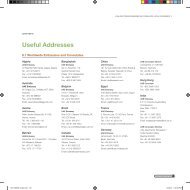Arab World Competitiveness Report 2011-2012 - World Economic ...
Arab World Competitiveness Report 2011-2012 - World Economic ...
Arab World Competitiveness Report 2011-2012 - World Economic ...
You also want an ePaper? Increase the reach of your titles
YUMPU automatically turns print PDFs into web optimized ePapers that Google loves.
2. Opportunities and Challenges in the MENA Region<br />
<strong>Arab</strong> <strong>World</strong> <strong>Competitiveness</strong> <strong>Report</strong> <strong>2011</strong>-<strong>2012</strong><br />
46<br />
Emigration is expected to rise as a result of<br />
the <strong>Arab</strong> Spring<br />
Emigration is expected to increase in those countries<br />
most affected by the <strong>Arab</strong> Spring. Emigration to GCC<br />
countries, which already host significant shares of <strong>Arab</strong><br />
immigrants, is expected to rise. Numerous accounts<br />
have been reported of emigrants fleeing from Northern<br />
Africa to Europe. Furthermore, a survey of Egyptian<br />
young people by the International Organisation for<br />
Migration found that the onset of protests and instability<br />
may have acted as a primary push factor for youth who<br />
reported prior intentions to migrate. The survey’s results<br />
indicate that two-thirds of respondents with migration<br />
intentions who were working prior to the start of the<br />
protests were negatively affected by the events: 26<br />
percent lost their jobs, 20 percent were asked to take<br />
unpaid leave, and 19 percent witnessed a reduction in<br />
their working hours. 23<br />
The security situation in Libya – which hosted around<br />
1.5 million migrant workers in 2010, mostly from Egypt<br />
and Tunisia – is also expected to have negative effects:<br />
it is estimated that, around 100,000 Tunisians have<br />
returned to their country following the conflict in Libya.<br />
However, the Libyan National Transition Council’s<br />
territorial and political successes and its recognition by<br />
many countries and the UN are seen as signs of hope<br />
for the reconstruction of Libya and the stabilization of<br />
emigration from the country.<br />
Fighting corruption and strengthening the rule<br />
of law are essential for economic growth and<br />
development<br />
Along with high unemployment levels and limited<br />
economic opportunities, the main drivers of the <strong>Arab</strong><br />
Spring have included pervasive corruption, cronyism,<br />
and lack of democratic representation. And, although<br />
these concerns can be generally identified as the<br />
“political” demands of protestors, it is undeniable that<br />
they can also have significant effects on economic<br />
activity and investment decisions. Widespread<br />
corruption, for instance, hinders a level playing field<br />
for businesses and obstructs transparency and clarity<br />
in business environments. Similarly, cronyism, or the<br />
granting of special privileges based on relationships,<br />
distorts markets and competition, (e.g. by granting<br />
business contracts to a privileged few) and prevents<br />
government efficiency (e.g. by appointing government<br />
officials based on relationships and not on merit). The<br />
<strong>World</strong> <strong>Economic</strong> Forum (<strong>2011</strong>) has confirmed that<br />
corruption is a problematic factor for doing business in<br />
the <strong>Arab</strong> <strong>World</strong>, especially in the Levant and in North<br />
Africa.<br />
High levels of corruption and the misuse of political<br />
power have existed for some time in the MENA region.<br />
According to Transparency International’s Corruption<br />
Perceptions Index (2010), the MENA region is widely<br />
perceived as very corrupt, with an average score of 3.1. 24<br />
The only two MENA countries to perform well in the<br />
index are Qatar (7.7) and the United <strong>Arab</strong> Emirates (6.3).<br />
The <strong>Arab</strong> Spring and the reform process that it has<br />
unleashed in some countries constitute an invaluable<br />
opportunity to fight corruption and to promote the<br />
rule of law. The Egyptian and Tunisian transitional<br />
governments have pledged to investigate corruption<br />
and abuses by former regimes, and expect to introduce<br />
measures to improve governance and transparency,<br />
including addressing conflicts of interests, abuse<br />
of power, and the realization of private gains from a<br />
public position. The MENA-OECD Working Group on<br />
Corporate Governance is placing a particular emphasis<br />
on good practices related to state-owned enterprises<br />
(SOEs), such as transparency and disclosure, the<br />
organization of the ownership function, and regulatory<br />
functions. Positive results, however, cannot be expected<br />
quickly, given the entrenched character of corruption.





